What the "city of the future" that Toyota is going to build in Japan will look like
The city of the future will be installed near Fuji, the sacred mountain of the Japanese. It will be a place to experiment with all these innovations.

A city of the future, where cars drive themselves, smart houses are built and most processes are dominated by technology, sustainability, and artificial intelligence? Although it seems like a futuristic dream, Toyota announced this Tuesday, during the CES technology fair held in Las Vegas, the creation of Woven City, an urban prototype that was called the "laboratory of the future".
"Building a complete city from scratch, even on a small scale like this, is a unique opportunity to develop future technologies, including a digital operating system for the city's infrastructure," said Toyota CEO Akio Toyoda. The main goal of the Woven City is to make it work as a kind of 'living laboratory', where its residents - and developers - can test and create technologies of autonomous machines, robotics, mobility, smart homes, and Artificial Intelligence within a real environment.
To this end, Toyota - one of the world's largest vehicle manufacturers - has set aside 175 acres (about 70 hectares) near Fuji, the sacred mountain in central Japan, to develop the project. "With people, buildings and vehicles connected and communicating with each other through data and sensors, we will be able to know how connected Artificial Intelligence works. Both in the virtual and physical realms," Toyoda added. But what will this city be like?
Design in wood and renewable energies
The design of Woven City was commissioned to Danish architect Bjarke Ingels, who has been the brains behind Google's headquarters in California and London and the so-called "Lego House" in Denmark. According to Toyota, the city's master plan includes three types of streets to accommodate various mobility needs.
Fast traffic will be limited to one class of vehicle, which is electric, autonomous, and certified as zero-emissions; slower traffic - for skateboards, bicycles, and pedestrians - will use another, and a kind of boulevard park will be dedicated exclusively to pedestrians. These three kinds of streets will be united in an organic grid, hence the name "woven city".
The project also states that the houses will be made of wood and that they will be built using an ancient Japanese technique and robotic production methods. "Technologies are beginning to radically change the way we live and navigate our cities," the Danish architect said. "We believe that with Woven City we have a unique opportunity to explore new forms of urbanism that could pave the way for other cities to explore," he added.
What about energy? Toyota said roofs will be built with solar panels, which will help the main power supply, which will be powered by hydrogen fuel cells. With the houses standing, Toyoda announced, the next step will be connectivity: all homes will be equipped with various technologies, including even sensor-based artificial intelligence to monitor people's health.
Reactions
The place where Woven City will be built -whose construction will start in 2021- is an old factory that belongs to the company. The company said it expects people to come to the city who want to develop innovative projects related to urbanism and connectivity. "We welcome all those people who want to research technologies to improve the way we will live in the future, so they can take advantage of this unique research ecosystem," Toyoda said.
However, the urban plan states that the city will have a capacity for 2,000 inhabitants, most of whom will be Toyota employees and guest researchers. The announcement of space of this magnitude, destined exclusively for the vision of the city in the future, has caused diverse reactions within the world of technology.
"Akio Toyoda has big plans for a small corner of the world, plans that one day could have a big impact on the other small corners of the world. Akio could even be called the 'Willy Wonka' of this generation," wrote journalist Larry P. Vellequett. But the Toyota announcement brought up another similar project: the smart city that Google subsidiary Sidewalk Labs have been planning to build near Toronto, Canada, and have ready by 2023.
This project has had several inconveniences and civil lawsuits from neighbors that the city would have, pointing out that it violates their privacy, privatizes public services such as transportation, and financially affects the area where they live. These critics are joined by urban planning experts who view the rise of so-called intelligent cities with suspicion.
"In the end, smart cities may destroy democracy," said Steven Poole in a long article in The Guardian. "As a city planner, Dan Hill says, 'the smart city was the wrong idea, wrongly presented to the wrong people, and the question was never answered: how will it tangibly and materially affect the way people live, work and play? he added.
Source BBC Mundo




